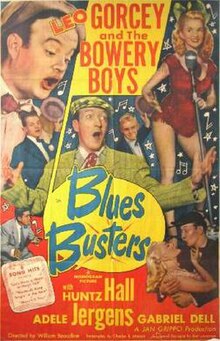Blues Busters is a 1950 American comedy film directed by William Beaudine and starring The Bowery Boys.[1] The film was released on October 29, 1950 by Monogram Pictures and is the twentieth film in the series.
| Blues Busters | |
|---|---|
 Theatrical poster | |
| Directed by | William Beaudine |
| Written by | Charles Marion Bert Lawrence |
| Produced by | Jan Grippo |
| Starring | Leo Gorcey Huntz Hall Gabriel Dell David Gorcey William Benedict |
| Cinematography | Marcel LePicard |
| Edited by | William Austin |
| Music by | Edward J. Kay |
| Distributed by | Monogram Pictures |
Release date |
|
Running time | 67 minutes |
| Country | United States |
| Language | English |
Plot
editSach develops an uncanny ability to sing, after having his tonsils removed, and Slip convinces Louie to turn his sweet shop into a nightclub, The Bowery Palace, after unsuccessfully trying to get Sach a singing job at a neighboring club, The Rio Cabana.
After Sach's singing makes him a star, Rick Martin, the owner of the now-rival club, tries to hire him away but is unsuccessful. Rick gets his lady friend, Lola, to get Sach to sign a contract with him, using the pretense that she is asking for his autograph. Rick then goes after the Bowery Palace's other star, Sally Dolan. She, however, does not want to go because Rick is after more than just her singing talent. She tips off Lola about what Rick is up to and Lola agrees to testify that Sach's signature was just an autograph and not a signed contract, thereby allowing him to return to the Bowery Palace. However, by this time Sach has gone to a doctor to help cure the "tickle in his throat' and he has lost the ability to sing.
Cast
editThe Bowery Boys
edit- Leo Gorcey as Terrance Aloysius 'Slip' Mahoney
- Huntz Hall as Horace Debussy 'Sach' Jones
- William Benedict as Whitey
- David Gorcey as Chuck
- Buddy Gorman as Butch
Remaining cast
edit- Gabriel Dell as Gabe Moreno
- Adele Jergens as Lola Stanton
- Bernard Gorcey as Louie Dumbrowski
- Craig Stevens as Rick Martin
- Phyllis Coates as Sally Dolan
- William Vincent as Teddy Davis
- Virginia Herrick (uncredited)[2]
Production
editThe working title of the film was The Bowery Thrush.[3] It is the last Bowery Boys film with Gabriel Dell. Tired of taking a back seat to co-stars Leo Gorcey and Huntz Hall,[citation needed] he decided to quit the series.
Home media
editThe film was released twice on home media, first on VHS by Warner Brothers on September 1, 1998 and then Warner Archives released the film on made-to-order DVD in the United States as part of "The Bowery Boys, Volume One" on November 23, 2012.
Soundtrack
edit- "Wasn't It You?"
- Written by Ben Raleigh and Bernie Wayne
- Played on a radio and sung by Huntz Hall (dubbed by John Laurenz)
- "Joshua Fit the Battle of Jericho"
- Traditional spiritual
- Sung by Adele Jergens in a nightclub (dubbed by Gloria Wood)
- "Bluebirds Keep Singin' in the Rain"
- Written by Johnny Lange and Eliot Daniel
- Published by Bulls Eye Music Inc. (ASCAP)
- Played on piano by Gabriel Dell
- Sung by Huntz Hall (dubbed by John Laurenz)
- Reprised by Huntz Hall in the nightclub (dubbed by John Laurenz)
- "Let's Have a Heart to Heart Talk"
- Written by Billy Austin, Edward Brandt and Paul Landers
- Played on piano by Gabriel Dell
- Sung by Huntz Hall (dubbed by John Laurenz)
- Reprised by Huntz Hall in the nightclub (dubbed by John Laurenz)
- "You Walk By"
- Written by Ben Raleigh and Bernie Wayne
- Played by the orchestra with Gabriel Dell on piano
- Sung by Huntz Hall (dubbed by John Laurenz)
- "Better Be Lookin' Out for Love"
- Written by Ralph Wolf and Johnny Lange
- Sung by Adele Jergens in a nightclub (dubbed by Gloria Wood)
- "Swanee River"
- Written by Stephen Foster (as Stephen Collins Foster)
- Jazzy version played by Gabriel Dell on piano
- Danced to by William 'Billy' Benedict, David Gorcey and Buddy Gorman
- "Dixie's Lan"
- Written by Daniel Decatur Emmett
- Sung by Leo Gorcey
According to a July 3, 1950 The Hollywood Reporter news item, singer Bob Carroll was the singing double for Huntz Hall, but reviews credit John Laurenz as his singing double. Carroll's participation in the final film has not been confirmed.[4]
References
edit- ^ Hayes, David (1982). The Films of the Bowery Boys. Secaucus, NJ: The Citadel Press. ISBN 978-0806509310.
- ^ "VIRGINIA HERRICK interview (2004)". Shopmemorylane.tripod.com. Retrieved 3 September 2021.
- ^ "AFI|Catalog". Catalog.afi.com. Retrieved 23 February 2022.
- ^ [1] [dead link]